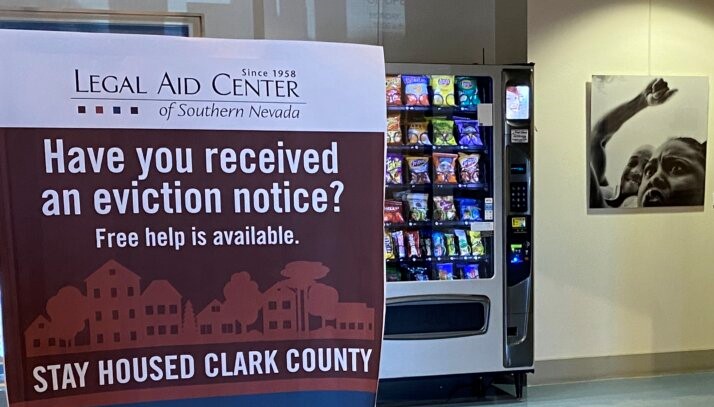“Nevadans should not panic,” a legal aid advocate said after the U.S. Supreme Court late Thursday struck down a Centers for Disease Control moratorium on evictions that had been scheduled to last through Oct. 3.
“Apply for rental assistance, respond to all eviction notices by filing an ‘Answer’ with the court, include that you have a pending rental assistance application and elect mediation. You shouldn’t be evicted,” Bailey Bortolin, policy director for Nevada Legal Aid Services said on social media shortly after the court’s ruling was announced.
The Nevada Legislature and courts “forged a path forward to ensure that families have a route to stay and resolve eviction proceedings until they are able to connect with rental assistance that is then paid directly to landlords,” Bortolin said.
She urged renters who fear eviction to apply for rental assistance from the CARES Housing Assistance Program.
“We encourage everyone to take action immediately and apply for rental assistance from the county they reside,” echoed Tiara Moore, Housing Justice Organizer with the Progressive Leadership of Alliance, in a statement Thursday night.
At the end of July, when the federal moratorium was set to expire and before it was known the CDC would issue an extension on August 3, Gov. Steve Sisolak announced there would be no additional state moratoriums to fill the gap.
But Sisolak said Assembly Bill 486 — the “path forward” Bortolin was referring to — which he signed into law earlier this year, will help tenants who are waiting for their rental assistance applications to be processed.
“This legislation helps ensure qualified tenants who are waiting for rental assistance applications to be processed are protected from being evicted for nonpayment of rent,” Sisolak said at the time. “AB 486 was enacted and creates a glide path for the end of the eviction moratorium. The law ensures both landlords and tenants will receive the benefits of $360 million in federally funded rental assistance to keep tenants in their homes, pay landlords and prevent avoidable evictions.”
The bill was supported by legal and housing justice groups, including Nevada Legal Aid Services and PLAN.
“With the passage of Assembly Bill 486, Nevadans still have some protections from eviction,” PLAN’s Moore said Thursday. “We urge all tenants facing eviction in Nevada to file an answer to the notice received, apply for CHAPs (rental assistance), and reach out to local legal service providers.”
Those providers include:
- Legal Aid Center of Southern Nevada, 702-386-1070;
- Washoe Legal Services, 775-329-2727
- Nevada Legal Services 702-383-6095 / 775-284-3491
“Tell people not to give up,” Bortolin said.
During a special legislative session last summer, lawmakers authorized the creation of a statewide eviction mediation program, which began in October.
Home Means Nevada, a nonprofit established by the Nevada Division of Business and Industry, runs the state’s eviction alternative dispute resolution program for tenants and landlords.
In addition to offering mediation between tenants and landlords, the program also helps tenants with rental assistance and unemployment.
‘The right to exclude’
The Supreme Court’s 6-to-3 opinion was in response to a case brought by landlord groups in Alabama and Georgia. They had won at the district court level, but that ruling had been stayed pending appeal.
The Supreme Court gave the realtors and landlords the decision they wanted Thursday.
“The moratorium has put the applicants, along with millions of landlords across the country, at risk of irreparable harm by depriving them of rent payments with no guarantee of eventual recovery,” reads the court’s opinion. Not allowing landlords to evict tenants “intrudes on one of the most fundamental elements of property ownership—the right to exclude.”
“It is up to Congress, not the CDC, to decide whether the public interest merits further action here,” the opinion concluded, agreeing with the argument made by landlords that the CDC had overstepped its legal authority by extending the moratorium early this month. “If a federally imposed eviction moratorium is to continue, Congress must specifically authorize it.”
Nevada Democratic Rep. Dina Titus Friday issued a statement calling on Congress to do just that.
“Days before the expiration of the July 31st moratorium, I wrote to Congressional leadership urging swift action to extend the moratorium. My stance hasn’t changed,” Titus said. “We need to protect millions of Americans at risk of homelessness as COVID spreads. I will continue to push for Congressional action to prevent a wave of evictions which could exacerbate the spread of COVID.”
The White House Thursday night issued a statement saying the administration “is disappointed that the Supreme Court has blocked the most recent CDC eviction moratorium while confirmed cases of the Delta variant are significant across the country. As a result of this ruling, families will face the painful impact of evictions, and communities across the country will face greater risk of exposure to COVID-19.”
Our stories may be republished online or in print under Creative Commons license CC BY-NC-ND 4.0. We ask that you edit only for style or to shorten, provide proper attribution and link to our website. AP and Getty images may not be republished. Please see our republishing guidelines for use of any other photos and graphics.




